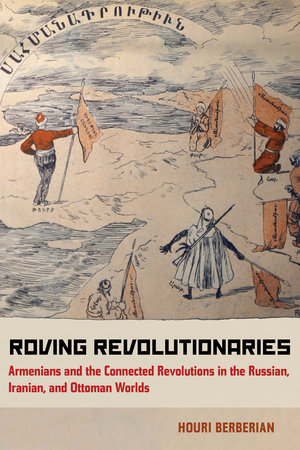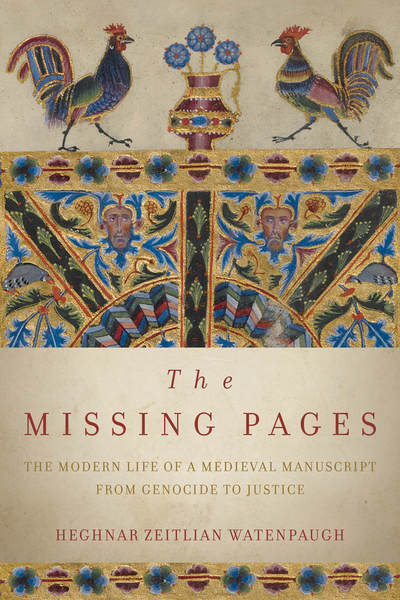The Society for Armenian Studies (SAS) has announced that Houri Berberian’s Roving Revolutionaries: Armenians and the Connected Revolutions in the Russian, Iranian, and Ottoman Worlds (Oakland: UC Press, 2019) and Heghnar Zeitlian Watenpaugh’s The Missing Pages: The Modern Life of a Medieval Manuscript, from Genocide to Justice (Stanford University Press) have been chosen as the recipients of the Der Mugrdechian SAS Outstanding Book Award for 2018-2019. An honorable mention has been awarded to James Barry’s Armenian Christians in Iran: Ethnicity, Religion, and Identity in the Islamic Republic (Cambridge University Press, 2018).
Established in 2015, the “Der Mugrdechian SAS Outstanding Book Award” accepts nominations for works that advance knowledge and scholarship on Armenian society, culture and history from ancient times to the present. Professor Barlow Der Mugrdechian, director of the Armenian Studies Program at California State University, Fresno and a past president of SAS, has generously offered to sponsor the award for the next five years.
According to the selection committee, both Roving Revolutionaries and The Missing Pages demonstrated substantive knowledge and an overall high level of scholarship. The “Der Mugrdechian SAS Outstanding Book Award” covered works published in 2018 to 2019. Berberian and Zeitlian Watenpaugh will each receive a $500 monetary award from SAS and a certificate of recognition.
In his congratulatory remarks to the authors, SAS President Bedross Der Matossian said, “This year we received more than a dozen books for the award. All of them were excellent books from different disciplines in the field of Armenian Studies. The level of competition was very high and a testament to the fact that the field of Armenian Studies is evolving in a very positive manner. I would like to thank the four senior scholars of the selection committee who rigorously examined all of the books.”
 In her book Roving Revolutionaries, Berberian probes the interconnected aspects of the Russian Revolution of 1905, the Iranian Revolution 1905-1911, and the Young Turk Revolution of 1908 and the role of the Armenian revolutionaries. The movements of these Armenians and their participation within and across frontiers provide us unique global insight into the major transformations that shaped the modern period. Through extensive archival work, Beberian examines the circulation of revolutionary ideas, revolutionaries and printed material. By doing so she provides a novel approach to our understanding of revolutions and revolutionary movements
In her book Roving Revolutionaries, Berberian probes the interconnected aspects of the Russian Revolution of 1905, the Iranian Revolution 1905-1911, and the Young Turk Revolution of 1908 and the role of the Armenian revolutionaries. The movements of these Armenians and their participation within and across frontiers provide us unique global insight into the major transformations that shaped the modern period. Through extensive archival work, Beberian examines the circulation of revolutionary ideas, revolutionaries and printed material. By doing so she provides a novel approach to our understanding of revolutions and revolutionary movements
History professor Houri Berberian is also the Meghrouni Family Presidential Chair in Armenian Studies and director of the Armenian Studies Program at the University of California, Irvine. She is the author of a number of articles on Armenians and revolution, Armenian women and identity. In 2001, she authored Armenians and the Iranian Constitutional Revolution of 1905-1911: The Love for Freedom Has No Fatherland (Westview).
“Please accept my most sincere gratitude for selecting my book, Roving Revolutionaries, as a co-recipient of the ‘Der Mugrdechian Armenian Studies Book Award.’ I am doubly delighted and honored that I share the recognition bestowed by the Society for Armenian Studies with UC colleague Heghnar Zeitlian Watenpaugh,” said Berberian. “The award acknowledges the significance of studying Armenians within a broader regional and global context and of engaging with theoretical approaches such as connected histories. Through their geographic and ideological boundary crossings, Armenians serve as ideal subjects who connect early twentieth-century revolutions.”
 In The Missing Pages Heghnar Zeitlian Watenpaugh reconstructs the life of the Zeytun Gospel from the medieval period until its final destination in the J. Paul Getty Museum. Though an analysis of the biography of the manuscript, she tells the larger story of the Armenians and the suffering they endured during the Armenian Genocide and its aftermath. Following the journey of the missing pages of the manuscript, Zeitlian Watenpaugh weaves together a beautiful story of an art work from resilience to the will to survive extermination against all odds.
In The Missing Pages Heghnar Zeitlian Watenpaugh reconstructs the life of the Zeytun Gospel from the medieval period until its final destination in the J. Paul Getty Museum. Though an analysis of the biography of the manuscript, she tells the larger story of the Armenians and the suffering they endured during the Armenian Genocide and its aftermath. Following the journey of the missing pages of the manuscript, Zeitlian Watenpaugh weaves together a beautiful story of an art work from resilience to the will to survive extermination against all odds.
Heghnar Zeitlian Watenpaugh is professor of art history at the University of California, Davis. She is the award-winning author of The Image of an Ottoman City: Architecture in Aleppo (2004). Her writing has also appeared in the Huffington Post and the Los Angeles Times.
“I am honored to have received this award, and I am thrilled to be a co-winner with the brilliant scholar and my friend, Professor Houri Berberian,” said Zeitlian Watenpaugh. “That this award comes from the Society for Armenian Studies is deeply meaningful, as the members of the Society know first-hand the challenges and obstacles of researching Armenian topics. I am honored to be a member of a Society that not only promotes excellence in research, but also fosters a supportive and convivial community of scholars from around the world. To me, this award celebrates Armenian art history in general, and the wonderful exhibitions and books on Armenian art that have appeared in the last couple of years. I hope this award inspires people to discover and rediscover medieval Armenian art, its astonishing beauty and continued contemporary relevance.”



Be the first to comment